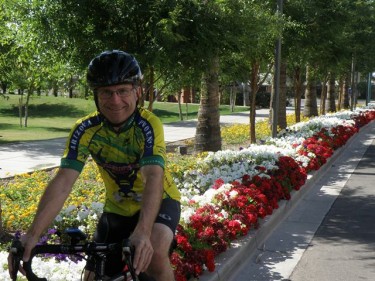By Cooper Nelson
GCU News Bureau
At 5-foot-8, Brian McGuire might be pound-for-pound the most athletic person on campus.
The Grand Canyon University executive director of institutional research — an avid long-distance cyclist— completed a four-day, 750-mile brevet series ride last year and will begin a coast-to-coast ride Sunday.
McGuire will join 30 cyclists from around the world to participate in the triennial Pacific Atlantic Cycling Tour Elite Transcontinental. The tour is a ride (not race) supported by car teams that aid members and transport equipment, similar to that of the Tour de France. A disclaimer on the PAC Tour website describes the event as “the toughest two-week tour in the world.”
Cyclists on the tour will cover 2,788 miles over the course of 17 days, from San Diego to Tybee Island, Ga. The group will ride from sunrise to sunset, averaging close to 164 miles per day, while keeping a minimum pace of 14 mph.
Over the course of the PAC Tour, the group will climb nearly 88,000 feet (an average of 5,224 feet each day) and traverse nine states through various terrains. Makeshift food stations are made up on the beds of trucks or on roadside tables every 30 miles. The group will have a hotel in which to stay each night.
Cyclists ceremoniously start the race by dipping their bike’s front tire in the Pacific Ocean off San Diego’s coast, and they end the race by dipping the same tire in the Atlantic Ocean off the coast of Georgia. McGuire said the notion of riding non-stop for two weeks can be intimidating.
“The mental challenge is the biggest thing,” said McGuire, adding that his mind “empties” during long races as his body focuses more on his working muscles.
“You can learn how to physically train and you can tell if you’re physically ready, but how do you tell if you’re mentally ready?”
McGuire, who has been cycling for only three years, began training for the PAC Tour last November. He trained by cycling 125-400 miles on weekends, participating in GCU Rec Center boot camp classes and competing in timed brevet races. He originally began cycling as a form of exercise and mental rejuvenation before work.
From Sea to Shining Sea
Brian McGuire will blog his entire 17-day cycling tour while on the road. The site already includes the tour route and pre-race packing and bike tuning. McGuire plans to post pictures and give first-hand accounts of the trip. The blog can be viewed at bsmcguire.wordpress.com.
McGuire, 55, eventually began riding with other GCU employees and joined the Bull Shifters Bicycling Club as cycling became more of a passion. He said his Bull Shifters club members and fellow cyclists at the University were his inspiration for undertaking the PAC Tour.
GCU’s head athletic trainer, Geordie Hackett, regularly competes in competitive mountain biking and cross-trained by cycling with McGuire in the past. Hackett’s 30-mile races are on a much smaller scale than the PAC Tour, but he said his experience in cycling and nutrition gives him a perspective on what McGuire can expect.
“Every race that I’ve seen that has multiple days in succession is obviously very mentally and physically demanding,” Hackett said. “If you’re biking six hours every day and burn about 1,000 calories an hour, you’re averaging burning 6,000 calories a day. How do you survive that?
“You have to be a machine.”
McGuire said he joined the tour for the experience and as a way to test his ability against other cyclists. He set a goal to qualify for the Race Across America transcontinental cycling race by not being sagged – a cycling term for falling behind the pack and then forced to be picked up and transferred via vehicle. But he said the time he put in training would be justified simply by finishing.
“My whole life for seven months has been dedicated to this. A lot of other things in life have been put on hold,” McGuire said.
“I just want to finish. That’s good enough.”
Contact Cooper Nelson at 639.7511 or [email protected].










































































